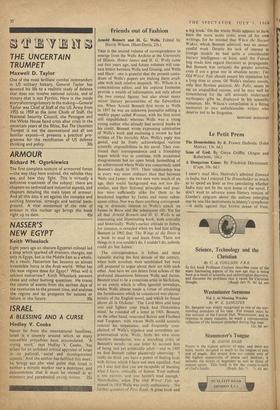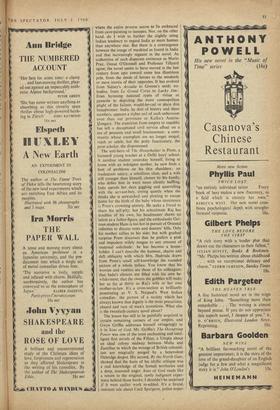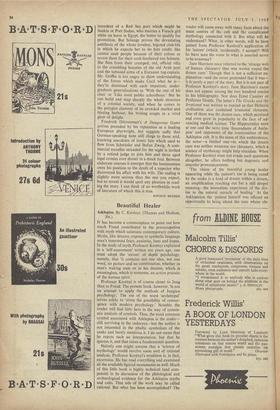Le Petit Prem
A Dangerous Game. By Friedrich Diirrenmatt. (Cape, 10s. 6d.) I DIDN'T read Mrs. Jhabvala's admired Esmond in India, but I enjoyed The Householder so much as to spend an hour or two speculating whether India may not be the next home of the novel. don't want to advance some literary version of Goethe's epigram about the nations emerging one by one like instruments in history's symphony —it melts against that brown ocean of lives, where the entire process seems to lie embraced from cave-painting to isotopes. Nor, on the other
hand, do I wish to further the slightly smug Indian tendency to regard India as more human than anywhere else. But there is a convergence between the image of mankind as found in India and that increasingly regnant in the novel. As authorities of such disparate eminence as Mario Praz. Donat O'Donnell and Professor Tillyard agree, the novel seems tb have moved in the last century from epic toward some less illustrious
pole, from the deeds of heroes to the misdeeds or mere inertia of their opposites. It has evolved from Sidney's Arcadia to Greene's seedy no- bodies, from Le Grand Cyrus to Lucky Jim: from hymning national types of virtue or panache to depicting the more cosmopolitan plight of the failure, would-be-cad or .plain dim breadwinner. India, by dint of history and sheer numbers, appears a richer soil of such unheroism even than our provinces or Kafka's Austria- Lfungary. The transition from empire to republic has left a decapitated civil service afloat on a sea of peasants and small businessmen: a com- munity whose exemplars are no longer mogul, rajah or sahib, but the petty functionary, the poor scholar, the dispossessed.
The anti-hero of The Householder is Prem, a harassed young teacher at a Delhi boys' school. A carefree student yesterday himself, living at home with an indulgent mother, he now finds a host of problems on his thin shoulders: an inadequate salary, a rebellious class, and a wife still younger than himself, chosen by his family. who defies him in ways more silently baffling. Indu spends her, days giggling and quarrelling with the servant-boy, crying quietly when she thinks she is unwatched and plotting to escape home for the birth of the baby whose imminence i3 Prem's crowning anxiety. He seeks a friend to share his self-pity; but his schoolmate Raj has troubles of his own, his headmaster shows no talent as a father-figure, and the enthusiastic Ger- man student Hans is too hot in pursuit of Oriental infinities to discuss rents and doctors' bills. Only his mother rallies to his side; but with gradual surprise Prem discovers that he prefers a pink and impudent wifely tongue to any amount of maternal solicitude: he has become a house- holder. I can't describe the humour, charm and deft obliquity with which Mrs. Jhabvala draws from Prem's small self-knowledge the rounded picture of a whole milieu. You know that his worries and vanities are those of his colleagues; that lndu's silences are filled with his own be- wilderment; that the sweets she gobbles will make her as fat at thirty as Raj's wife or her own mother-in-law. It's A cross-section as brilliantly penetrating as V. S. Naipaul's West Indian comedies: the picture of a society which has always known that dignity is the most precarious, absurd and rare of man's inventions. What else is the twentieth-century novel about?
The lesson has still to be painfully acquired in certain remaining corners of our empire, and Gwyn Griffin addresses himself swingeingly to it in Sons of God. Mr. Griffin's The Occupying Power was one of the most enchanting and intel- ligent first novels of the Fifties, a Utopia about an ideal colony midway between Malta and Zanzibar in which the wrongs of British colonial- ism are magically purged by a benevolent Oxbridge despot. His second, By the North Gate, showed that the basis of his idyllic critique was a real knowledge of the Somali territories and a deep, reasoned anger. Sons of God reads like a return to the original, rawly indignant exper- ience behind those books; I shouldn't be surprised if it were earlier work re-edited. It's a brutal, insistent tale about Cecil Spurgeon, police super- intendent of a Red Sea port which might be Suakin or Port Sudan, who marries a French girl while on leave in Egypt, the better to qualify for promotion. But Solenge proves the devastating antithesis of the whole loveless, bigoted club-life in which he expects her to do him credit. She cannot snub people because of their colour or revere them for their cock-feathered sun helmets. She flees from their cramped, red, official villa to the crumbling beauties of the old Arab port and the tattooed arms of a Eurasian tug-captain. Mr. Griffin is too angry to show understanding of the forces which make Cecil what he is— they're dismissed with such impatient, under- graduate generalisations as 'With the rest of his class' or 'Like most public schoolboys.' But he can build and map sharply the whole structure of a colonial society, and when he comes to the polyglot clamour of its crowded market and blazing harbour, his writing erupts in a vivid glow of delight.
Friedrich Diirrenmatt's A Dangerous Game arrives preceded by his reputation as a leading European playwright, but suggests sadly that German-speaking taste still clings to those arid, knowing anecdotes of ironic fate which used to flow from Schnitzler and Stefan Zweig. A com- mercial traveller stranded for the night is invited by a retired judge to join him and three aged legal cronies over dinner in a mock trial. Between elaborate courses it emerges that the businessman owes his position to the death of a superior who discovered his affair with his wife. The ending is slightly more serious than the one you expect, but to reveal it would spoil any pleasure in read- ing the story. I can think of no worthwhile work of literature of which this is true.
RONALD BRYDEN




























































 Previous page
Previous page